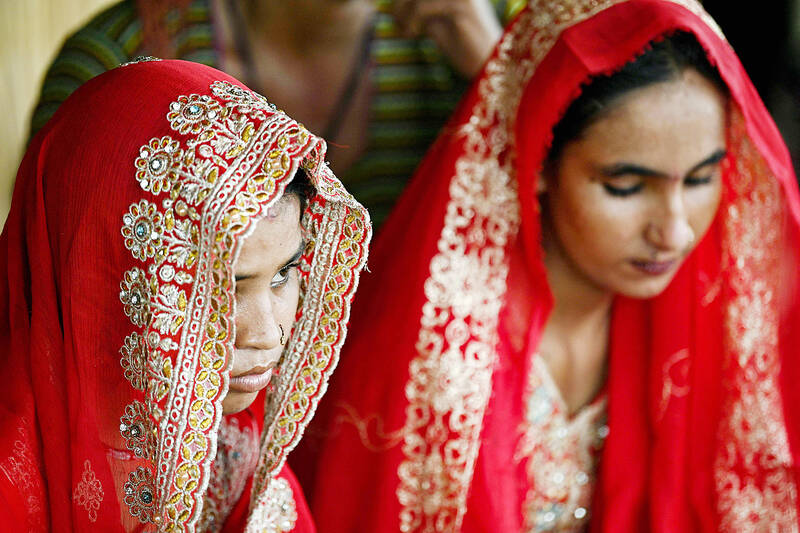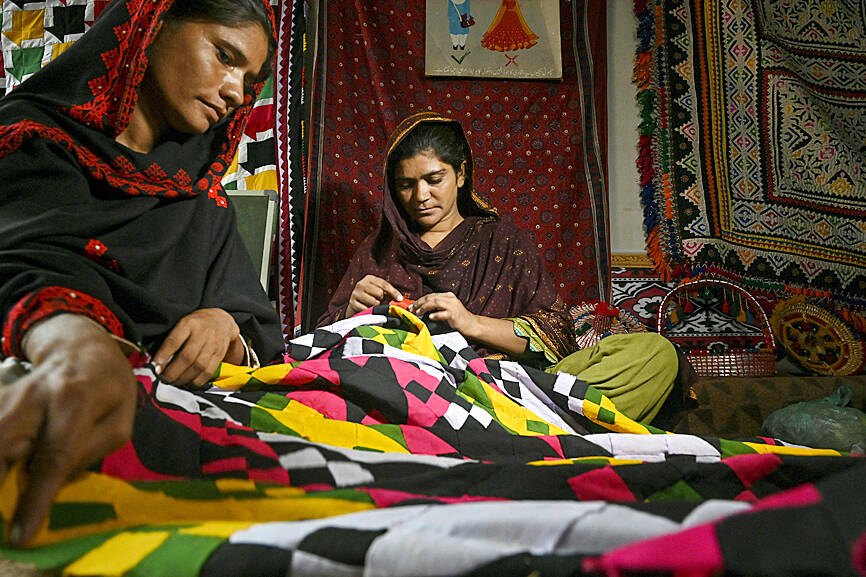As monsoon rains were about to break over Pakistan, 14-year-old Shamila and her 13-year-old sister Amina were married off in exchange for money, a decision their parents made to help the family survive the threat of floods.
“I was happy to hear I was getting married... I thought my life would become easier,” Shamila said after her wedding to a man twice her age in hope of a more prosperous life. “But I have nothing more, and with the rain, I fear I will have even less, if that is possible.”
Pakistan’s high rate of marriages for underage girls had been inching lower in the past few years, but after unprecedented floods in 2022, rights workers say that such weddings are on the rise due to climate-driven economic insecurity.

Photo: AFP
The summer monsoon between July and September is vital for the livelihoods of millions of farmers and food security, but scientists say climate change is making them heavier and longer, raising the risk of landslides, floods and long-term crop damage.
Many villages in the agricultural belt of Sindh Province have not recovered from the 2022 floods, which plunged one-third of the country underwater, displaced millions and ruined harvests.
“This has led to a new trend of ‘monsoon brides,’” said Mashooque Birhmani, the founder of the non-governmental organization Sujag Sansar, which works with religious academics to combat child marriage.

Photo: AFP
“Families will find any means of survival. The first and most obvious way is to give their daughters away in marriage in exchange for money,” Birhmani said.
Since the 2022 floods, child marriage has spiked in villages in Dadu District, one of the worst-hit areas that for months resembled a lake, he said.
In Khan Mohammad Mallah village, where Shamila and Amina were married in a joint ceremony in June, 45 underage girls have become wives since the last monsoon.
Fifteen of them were married in May and June.
“Before the 2022 rains, there was no such need to get girls married so young in our area,” village elder Mai Hajani, 65, said. “They would work on the land, make rope for wooden beds, the men would be busy with fishing and agriculture. There was always work to be done.”
Parents said that they hurried the marriage of their daughters to save them from poverty, usually in exchange for money.
Shamila’s mother-in-law, Bibi Sachal, said they gave 200,000 rupees (US$720.86) to the young bride’s parents — a major sum in a region where most families survive on about US$1 a day.
Najma Ali was initially swept up in the excitement of becoming a wife when she married at 14 in 2022 and began living with her in-laws, as is tradition in Pakistan.
“My husband gave my parents 250,000 rupees for our wedding, but it was on loan [from a third party] that he has no way of paying back now,” she said.
“I thought I would get lipstick, makeup, clothes and crockery,” she said, cradling her six-month-old baby. “Now I am back home with a husband and a baby because we have nothing to eat.”
Their village, which lies on the banks of a canal in the Main Nara Valley, is barren and there are no fish left in the polluted water. Its stench overwhelms the area.
“We had lush rice fields where girls used to work,” said Hakim Zaadi, 58, the village matron and Najma’s mother.
“They would grow many vegetables, which are all dead now because the water in the ground is poisonous. This has happened especially after 2022,” she added. “The girls were not a burden on us before then. At the age girls used to get married, they now have five children, and they come back to live with their parents because their husbands are jobless.”
Child marriages are common in parts of Pakistan, which has the sixth-highest number of girls married before the age of 18 in the world, government data published in December last year showed.
The legal age for marriage varies from 16 to 18 in different regions, but the law is rarely enforced.
The UN Children’s Fund has reported “significant strides” in reducing child marriage, but evidence shows that extreme weather events put girls at risk.
“We would expect to see an 18 percent increase in the prevalence of child marriage, equivalent to erasing five years of progress,” it said in a report after the 2022 floods.
Dildar Ali Sheikh, 31, had planned to marry off his eldest daughter Mehtab while living in an aid camp after being displaced by the floods.
“When I was there, I thought to myself: ‘We should get our daughter married so at least she can eat and have basic facilities,’” the daily wage laborer said.
Mehtab was 10 years old at the time.
“The night I decided to get her married, I couldn’t sleep,” said her mother, Sumbal Ali Sheikh, who was 18 when she married.
An intervention from Sujag Sansar led to the wedding being postponed, and Mehtab was enrolled in a sewing workshop, allowing her to earn a small income while continuing her education.
However, when the monsoon rains fall, she is overcome by dread that her promised wedding would also arrive.
“I have told my father I want to study,” she said. “I see married girls around me who have very challenging lives and I don’t want this for myself.”

In Italy’s storied gold-making hubs, jewelers are reworking their designs to trim gold content as they race to blunt the effect of record prices and appeal to shoppers watching their budgets. Gold prices hit a record high on Thursday, surging near US$5,600 an ounce, more than double a year ago as geopolitical concerns and jitters over trade pushed investors toward the safe-haven asset. The rally is putting undue pressure on small artisans as they face mounting demands from customers, including international brands, to produce cheaper items, from signature pieces to wedding rings, according to interviews with four independent jewelers in Italy’s main

Japanese Prime Minister Sanae Takaichi has talked up the benefits of a weaker yen in a campaign speech, adopting a tone at odds with her finance ministry, which has refused to rule out any options to counter excessive foreign exchange volatility. Takaichi later softened her stance, saying she did not have a preference for the yen’s direction. “People say the weak yen is bad right now, but for export industries, it’s a major opportunity,” Takaichi said on Saturday at a rally for Liberal Democratic Party candidate Daishiro Yamagiwa in Kanagawa Prefecture ahead of a snap election on Sunday. “Whether it’s selling food or

CONCERNS: Tech companies investing in AI businesses that purchase their products have raised questions among investors that they are artificially propping up demand Nvidia Corp chief executive officer Jensen Huang (黃仁勳) on Saturday said that the company would be participating in OpenAI’s latest funding round, describing it as potentially “the largest investment we’ve ever made.” “We will invest a great deal of money,” Huang told reporters while visiting Taipei. “I believe in OpenAI. The work that they do is incredible. They’re one of the most consequential companies of our time.” Huang did not say exactly how much Nvidia might contribute, but described the investment as “huge.” “Let Sam announce how much he’s going to raise — it’s for him to decide,” Huang said, referring to OpenAI

The global server market is expected to grow 12.8 percent annually this year, with artificial intelligence (AI) servers projected to account for 16.5 percent, driven by continued investment in AI infrastructure by major cloud service providers (CSPs), market researcher TrendForce Corp (集邦科技) said yesterday. Global AI server shipments this year are expected to increase 28 percent year-on-year to more than 2.7 million units, driven by sustained demand from CSPs and government sovereign cloud projects, TrendForce analyst Frank Kung (龔明德) told the Taipei Times. Demand for GPU-based AI servers, including Nvidia Corp’s GB and Vera Rubin rack systems, is expected to remain high,